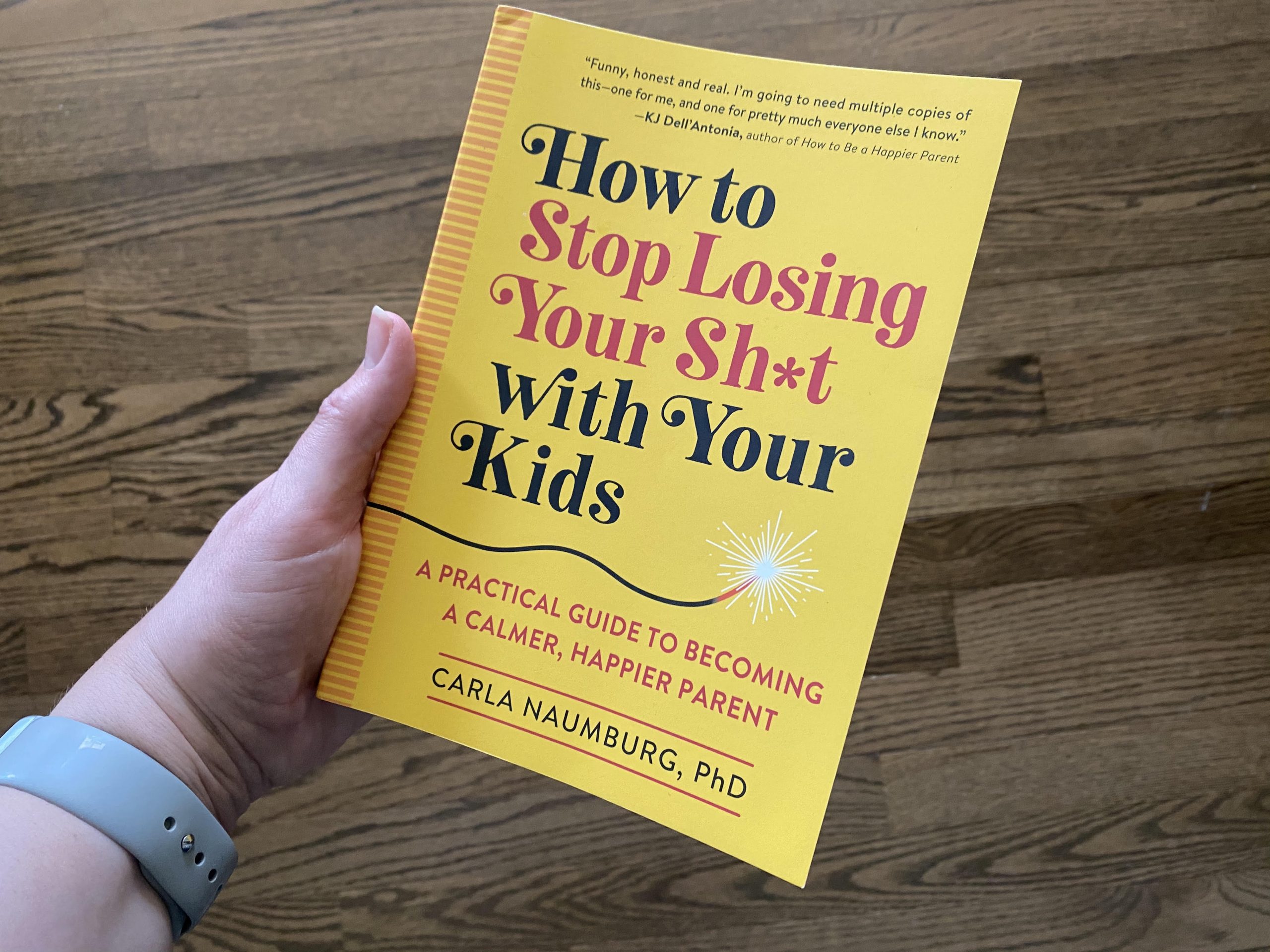The book “How to Stop Losing Your Sh*t with Your Kids: A Practical Guide to Becoming a Calmer, Happier Parent” by Carla Naumburg came into my life at a time when I needed it most. In the last year, I traded one type of stress for another, going from working full-time to being a full-time mom to a 3.5-year-old son and a 7-month-old daughter. Did you know kids have a lot of energy? More energy than I can handle, apparently, and my son knows it. He sometimes pushes me to the very edge and, even though I know I’m a good mom, I sometimes turn into an angry, yelling drill sergeant. My daughter hasn’t pushed my buttons yet, but I can sense my son wants to recruit her into his Button Pusher Club. In honor of National Book Lovers Day on August 9th, I wanted to share my thoughts on this parenting book that I highly recommend. I needed this book, and if you’re like me, you do too.

Mommy’s Triggers and Those Pesky Little Button Pushers
I’m not going to give away everything about this book, because I think you should absolutely read it. It took me a solid week, and it was worth it. I’ve never actually finished a parenting book from start to finish before now, but this isn’t your typical parenting book. With relatable stories and funny acronyms that made me giggle, this book opened my eyes to a different parenting approach. Instead of focusing on changing your child’s behavior, Naumburg suggests ways to help yourself deal with their behavior better. I took that to mean if I am able to learn how to be calmer, my son will be less likely to want to push my buttons. It sounds easy but if it were easy, I wouldn’t need this book.
Naumburg suggests that you first identify what your triggers are; those things that make you angry at your child (AKA, your Button Pusher). It literally has a list in the back of the book of potential triggers. I sat down and listed out my triggers, and by doing that, I’m working on identifying when my buttons are pushed and when I am on the countdown to losing it before I actually lose it.
Everyone’s triggers are different. For me, I realized that my biggest trigger is not having enough alone time. When you break it down, I spend about ten to twelve hours during the day taking care of two small humans. Most nights, my son sleeps wedged in next to me. So I spend very little time alone, by myself, not being physically touched by someone. That makes me understandably irritable during the day and sleep-deprived at night. Not a good mental health cycle for mommy. I now know some new methods on how to get more alone time, even if I physically can’t leave my children, and it has helped.
Another trigger of mine is clutter in the house. When I see my son making a huge mess and walking away without cleaning it up, that makes me bonkers mad. When you identify your triggers, you can start to notice when you are on the verge of losing it. Now, when I see my son dumping all of the pom-poms out of the bin, I take a step back, take a deep breath, and try to let it go. Try being the keyword here.
Getting My Sh*t Together
Like I mentioned, my fuse has been very short lately, and I have been telling myself to work on not being so reactive toward my son. It takes a lot for me to actually pause, notice that I’m losing it, and stop. There have been countless times that I go through the cycle: yelling, my son cries, then I cry because I feel ashamed for yelling, then I call my mom and ask her if I’m a terrible parent, and then the cycle starts over again.
Since reading this book, I have really worked on noticing when I am being triggered. Sometimes I remind myself in the morning, if I had a crummy night’s sleep, that I will probably be easily triggered that day and I need to keep the day simple. I shouldn’t try to do a million things at once while scrolling through my phone and folding laundry and making lunches and changing diapers and you get the picture. One thing at a time. It truly took reading this book to realize this.
My Biggest Takeaway
The biggest takeaway from this book, and something the author constantly repeats, is that you are not a bad parent for losing your cool with your kids. Do not shame yourself if you do lose it. This is easier said than done, but this book has helped me accept that I will inevitably lose my cool sometimes, but the way that I handle it can improve.
Reading this book will not solve the problem, as a lot of other parenting books claim, but it will give you tools and practices on how to handle yourself when you’re on the brink. I was able to identify my triggers, have a come to Jesus moment with myself, and have a better approach than just simply yelling at my child. And if I do yell, I know how to recover and turn the day around. I encourage you, if you have the time, go to your favorite reading spot and read this book. If you start now, you can finish by National Book Lovers Day.
Find more on the author and her other publications here.
To purchase the book, click here.








